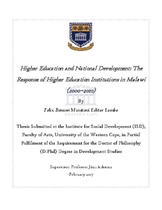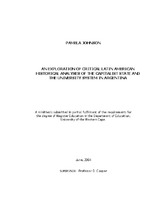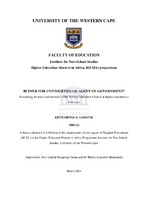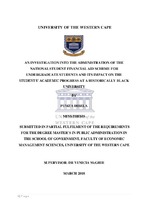| dc.description.abstract | Theoretically, the role of higher education in national development has become clearer than before, while empirically the evidence is overwhelming. Elsewhere in the world, countries that have made tremendous strides in both social and economic development invested heavily and strategically in higher education. In Malawi, the role of higher education in national development has always been recognised by development policies since independence in 1964 However, with the exception of the first 15 years of independence, Malawi’s development path has registered abysmal results both on the social and the economic fronts despite undergoing significant socio-economic and political reforms. Malawi remains one of the most underdeveloped countries whether judged by Gross National Product (GNP) per capita, the UNDP’s Human Development Index (HDI) or the Human Poverty Index (HPI). One of the factors that is considered as having contributed to low levels of development is the performance of education systems (primary, secondary and higher education) (World Bank, 2009).
It is against this background that this study sought to examine how Malawi’s higher education institutions (HEIs) have responded to their roles as prescribed by the national development policies with a focus on the period between 2000 and 2010. Four questions guided the study: i) what specific roles do national development policies define for HEIs to ensure that higher education contributes to national development? ii) To what extent are these roles performed by HEIs in Malawi? iii) What factors determine the performance of HEIs in their expected roles? iv) What pattern of response to their (HEIs’) expected roles can be identified? Theoretically and analytically, the study was informed by the two perspectives of the open systems theory, namely the resource-dependency approach and neo-institutional approach. These two approaches contend that actions by organisations are limited and influenced bym various pressures and demands emanating from their internal and external environments and that organisations often respond accordingly in order to survive. Methodologically, the study employed a mixed-method design (of qualitative and quantitative) with a dominant usage of qualitative methods. A multiple case study approach was used in which data were collected through unstructured interviews, semi-structured interviews and documentary review. For qualitative data, the analysis was done using a text method while quantitative data were analysed using Statistical Package for Social Sciences (SPSS) and Microsoft Excel to provide
simple descriptive analysis through charts, tables and graphs. xx Overall, the study found that Malawi development policies expect HEIs to enhance access, equity, relevance, efficiency and quality of higher education as a way of ensuring that higher education contributes to the national development project. However, the study identified several patterns of response by HEIs (towards these expected roles) that tentatively explain the suboptimal contribution of higher education in national development. These patterns of response include: inclination towards responding to the politically sensitive crises in the higher education system (for public HEIs) and profit-compatible roles (for private HEI); use of sub-standard resources and methods antithetical to genuine teaching and learning; duplication by private HEIs of the “soft” roles being undertaken by public HEI; the abandonment of some of the HEIs’ original ideals and founding pledges, which are compatible with national development roles; and substitution of long-term coherent academic planning by short-term survival strategies.
The study presents a number of implications, lessons and recommendations in the area of higher education and development. These include: the need for the government to recognise the importance and impact of intra-sectoral linkages in the entire education system on the performance of HEIs; the need to enforce the effective participation of private and public HEIs in national developmental project by establishing a proper regulatory framework; the need to enhance regional and internal collaboration among universities if they are to effectively respond to national roles; the need to reduce marginalisation of HEIs by maximising efforts that create linkages with the productive sector; the need to devise a robust public financing mechanism that broadly deals with issues of equity, relevance, quality and access of higher education; and the need to match education investment priorities and sequencing with development policies. | en_US |




